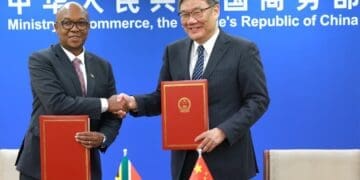Minister of Small Business Development Stella Ndabeni-Abrahams says the SEFDA Pay system will enable a secure, low-cost, and interoperable digital ecosystem, facilitating access to finance, record keeping and market participation.
“In doing so, it will position South Africa’s small-enterprise ecosystem for a cash-light, inclusive, and
data-driven economy, while advancing our national objectives of localisation,
transformation, and job creation,” Ndabeni Abrams told the StartUp 20 (SU20) Summit ahead of the G20 Summit, which starts in Johannesburg on November 22.
SEDFA Pay is a digital payments and financial-inclusion platform designed to integrate micro and informal enterprises, spaza shops, street traders, and township SMEs into the formal economy.
“SEDFA Pay will enable a secure, low-cost, and interoperable digital ecosystem, facilitating access to finance, record-keeping, and market participation,” Ndabeni-Abrahams said.
The Department of Small Business Development coordinated the SU20 Summit, bringing together entrepreneurs, investors, policymakers and ecosystem enablers from over 40 countries.
The summit highlighted the vital role of startups and SMEs in driving inclusive economic growth, fostering innovation, and creating jobs across local, national and global economies.
Ndabeni-Abrahams highlighted the importance of SMEs in shaping a just and sustainable economy.
“The hosting of the SU20 on African soil marks a profoundly significant milestone for South Africa and the continent. It reinforces our conviction that the transformation of the MSME and startup ecosystem is central to building a just, inclusive and sustainable economy that leaves no one behind,” said Ndabeni-Abrahams.
Panel discussions explored crucial themes for entrepreneurship and SMEs, including reviving SME funding through innovative and sustainable capital structures and scaling global entrepreneurship through funding and platform-based innovation. Experts, investors and ecosystem partners examined practical solutions for unlocking growth, investment and innovation.
Vuyani Jarana, Chairperson of SU20, stressed the transformative potential of small businesses globally.
“Small businesses and entrepreneurship are the only instruments that, if well-supported through progressive policies, skills development and funding, can create the much-needed jobs and opportunities for young people,” he said.
He further highlighted the importance of scalable interventions, warning that bespoke solutions often fail to reach the large number of aspiring entrepreneurs in developing economies.
Salome Baloyi, Chief Operations Officer and lead coordinator for South Africa’s G20 engagement groups, reflected on the summit’s broader significance.
“Our mission is to drive structural reforms, accelerate digital innovation and advance a bold agenda for startup and MSME development, focusing on innovation, inclusion and meaningful participation across all sectors,” she said.
Baloyi stressed that the G20 Presidency, under the theme Solidarity, Equality, Sustainability, must ensure global cooperation responds to local realities, empowering citizens to participate meaningfully in economic growth.
Deputy Director-General for Integrated Co-operatives and Micro Enterprise Development, Qinisile Delwa, highlighted the importance of cross-border market integration, innovation and digital transformation. She emphasised initiatives such as startup passport frameworks, digital trade equity indices, and tokenisation in agriculture as ways to enhance market access, finance, and business support for MSMEs worldwide.
The summit also showcased the global perspective of entrepreneurship. Khalid Almutawa, Entrepreneurship General Manager at Saudi Arabia’s National Technology Development Program, highlighted efforts to develop startups and SMEs through financial support, talent partnerships, and global networks.
“Our mission is to transform the kingdom into a globally competitive technology hub for fostering innovation and empowering entrepreneurship across the world,” he said, inviting attendees to explore the initiatives supporting startups in Saudi Arabia.
Nonzuzu Makanda, Chairperson of the Small Enterprise Development Finance Agency (SEDFA), highlighted the crucial role of early-stage businesses in driving innovation and resilience.
“We finance the unfunded, enable the excluded and transform the entrepreneurial landscape of South Africa,” she said, noting that over the past decade SEDFA has disbursed about R21 billion in loans and provided credit guarantees, with a focus on women, youth and underserved communities.
olga@vutivibusiness.co.za

































































